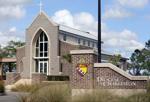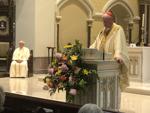Following Pope Francis’ lead, the Roman Catholic Diocese of Charleston has placed restrictions around the use of Latin during Mass in an effort to foster greater unity within the diocese.
Diocesan Bishop Robert E. Guglielmone’s new policy regarding the Tridentine Mass took effect Nov. 28. The rule prohibits the use of Latin while performing confirmation or baptism, but also limits the Latin celebration to four parishes in South Carolina: Stella Maris in Sullivan’s Island, Sacred Heart in downtown Charleston, Prince of Peace in Taylors and Our Lady of the Lake in Chapin.
The policy was issued in response to Pope Francis’ motu proprio Traditionis custodes, or guardians of the Traditions. The pope ordered on July 16 that bishops create rules for their respective dioceses around the Latin worship practice.
“Those priests who have been celebrating this Mass prior to the date of Pope Francis’ MOTU PROPRIO and who have indicated to me that they were doing so, may celebrate this Mass in above named parishes under the directives stated above,” Guglielmone’s policy states. “These priests have been notified of this permission.”
Celebrated exclusively in Latin, the Tridentine Mass had been authorized for use throughout the Roman Catholic Church from 1570 until it was replaced following the Second Vatican Council in the 1960s.
That council sought to “modernize and open the doors of Catholic practice, Catholic theology and identity to the modern world,” Matthew Cressler, religion professor at The College of Charleston, said.
Though most parishes accepted the change, there were Catholic groups who rejected the legitimacy of the council and its decision.
There are Catholics who favor the Tridentine Mass because of its beauty and history, the professor said. For them, the practice is near and dear because it was the style of worship they practiced growing up.
And there are other Catholics who see European-influenced Christendom as the only legitimate way to practice Catholicism, Cressler said.
One of the most significant undertakings at the Second Vatican Council was to reject anti-Semitic undertones that had been part of Christian tradition for centuries, Cressler said.
“One of the problematic elements in right-wing iterations of (the Tridentine Mass) … is it turns to Christian nationalism that embraces elements of anti-Semitism and Eurocentrism,” Cressler said.

Pope Benedict several years ago attempted to bring back into the fold the Catholics who had continued practicing the old Mass, issuing a policy to allow parishes to practice Tridentine Mass, the professor said.
“[Pope Benedict] thought what he was doing was unifying the church by bringing those communities back into the fold,” Cressler said. “The irony is that it actually increased division rather than removed it by allowing the communities that have rejected the Second Vatican Council to flourish.”
Francis’ recent policy attempts to foster unity by limiting the Latin worship, Cressler said.
Pope Francis and the Charleston Diocese seem to be an effort to bring together Catholics of diverse backgrounds by continuing to allow them to worship in their own languages, the professor said.
“Ironically because it’s been divisive, I think what Francis sees himself as doing is unifying the church,” Cressler said.

The diocese’s new policy places guidelines regarding using the Latin rite during sacraments of the church.
For baptism, Tridentine form is permitted only at the request of the individual parents. The practice is allowed for marriage only with permission of ordinary, and for funerals only at specific prior written request from the deceased.
Rev. Gregory West, who leads Saint Clare of Assisi on Daniel Island, said while both English and Latin expressions of the Mass have their place in the life of the church, unity in Catholic beliefs and practices is key to the church being truly universal.
“All forms of Catholic worship of God are to be reflections of beauty, grace and timelessness,” West said.
Reach Rickey Dennis at 937-4886. Follow him on Twitter @RCDJunior.
Credit: Source link




